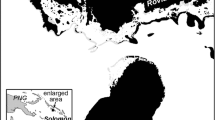Abstract
Marilyn Porter, Rosemarie Mwaipopo, Richard Faustine and Max Mzuma draw on data collected in two fishing communities in Tanzania to illustrate the global nature of the issues that women and coastal communities face. Coastal communities, such as Somanga and Songosongo, often suffer disproportionately from processes of interactive restructuring, and women are especially at risk.
Similar content being viewed by others
References
Allison, Charlene, Sue-Ellen Jacobs and Mary Porter (1989) Women in Northwest Commercial Fishing, Washington: University of Washington Press.
Bakker, Isabelle (ed.) (1994) The Strategic Silence, London: Zed Books.
Binkley, Marian (2002) Set Adrift: Fishing families, Toronto: University of Toronto Press.
Bryceson, Ian (2004) ‘Recent and Prospective of Aquaculture Developments in Tanzania Fishery’, Forum for Development Cooperation. Annual Meeting, Bergen, 31st March–1st April 2005.
Boserup, Ester (1970) Women's Role in Economic Development, London: George Allen and Unwin Ltd.
Cole, Sally (1991) Women of the Praia: Work and lives in a Portugese coastal community, Princeton: Princeton University Press.
Cornwall, Andrea, Elizabeth Harrison and Ann Whitehead (2007) Feminisms in Development: Contradictions, contestations and challenges, London: Zed Books.
Davis, Dona and Siri Gerrard (eds.) (2000) ‘Introduction – Gender and Resource Crisis in the North Atlantic Fisheries’, Women's Studies International Forum: Special Issue: Women and the Fisheries Crisis 23 (3), May: 279–286(8).
Elson, Diane (ed.) (1995) Male Bias in the Development Process, Manchester: Manchester University Press.
Faustine, Richard (2007) ‘Social Organisation and the Patterns of Utilisation and Management of Coastal Resources: A case study of Songosongo Island and Somanga village in Kilwa District, Tanzania’, MA Thesis, University of Dar es Salaam.
Griffith, David and Manuel Valdes Pizzini (2002) Fishers at Work, Workers at Sea, Philadelphia: Temple University Press.
Jackson, Cecile and Ruth Pearson (eds.) (1998) Feminist Visions of Development: Gender analysis and policy, London: Routledge.
Kabeer, Naila (1994) Reversed Realities, London: Verso.
Kerr, Joanna, Ellen Sprenger and Alison Symington (eds.) (2004) The Future of Women's Rights, London: Zed Books, AWID, Mama Cash.
Merchant, Carolyn (1995) Earthcare: Women and the environment, New York: Routledge.
Mesaki, Simeon (2005) ‘A Portrait of Kilwa: A glorious past, abundant potential and prosperous future’, unpublished paper.
Mukhopadhyay, Maitrayee and Franz Wong (2007) Revisiting Gender Training: The making and remaking of gender knowledge, Oxford: Oxfam.
Mzuma, Max (2007) ‘Reflections on Gender and Natural Resource Use and Management. A case study of Somanga village and Songosongo Island, Kilwa District’, MA Thesis, University of Dar es Salaam.
Nadel-Klein, Jane and Dona Davis (1988) To Work and to Weep: Women in fishing economies, St. John's, Newfoundland, Canada: Institute of Social and economic Research, Memorial University of Newfoundland.
Neis, Barbara, Marian Binkley, Siri Gerrard and Cristina Maneschy (eds.) (2005) Changing Tides: Gender, fisheries and globalisation, Halifax: Fernwood.
Newell, Dianne and Rosemary Ommer (eds.) (1999) Fishing Places, Fishing People, Toronto: University of Toronto Press.
Nowak, Barbara S. (1988) ‘The Cooperative Nature of Women's and Men's Roles in Btsisi' Marine Extracting Activities’, in Janes Nadel-Klein and Dona Davis (eds.) To Work and to Weep: Women in fishing economies, St. John's, Newfoundland, Canada: Institute of Social and economic Research, Memorial University of Newfoundland.
Saunders, Kriemild (2002) Feminist Post-Development Thought, London: Zed Books.
Sen, Gita and Caren Grown (1987) Development, Crises, and Alternative Visions, New York: Monthly Review Press.
Shiva, Vandana (1989) Staying Alive: Women, ecology and development, London: Zed Books.
Sparr, Patricia (ed.) (1994) Mortgaging Women's Lives: Feminist critiques of structural adjustment, London: Zed Books.
URT (2004) National Population and Housing Census 2002, Bureau of Statistics, Dar es Salaam.
Waring, Marilyn (1990) If Women Counted: A new feminist economics, New York: Harper Collins.
World Wildlife Fund (2005) ‘Rufiji-Mafia-Kilwa (RUMAKI) Seascape Programme (2004–2009). Collaborative Marine and Coastal Resources Management and Livelihoods and Development in Rufiji, Mafia and Kilwa Districts’, Unpublished, Dar es Salaam.
Additional information
Shows how women in coastal communities suffer disproportionately from processes of interactive restructuring
Rights and permissions
About this article
Cite this article
Porter, M., Mwaipopo, R., Faustine, R. et al. Globalization and Women in Coastal Communities in Tanzania. Development 51, 193–198 (2008). https://doi.org/10.1057/dev.2008.4
Published:
Issue Date:
DOI: https://doi.org/10.1057/dev.2008.4




